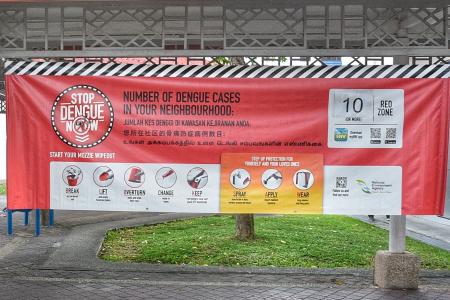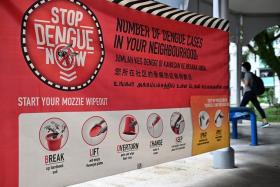What are the warning signs my dengue infection may become severe?
The nation has seen more than 16,000 cases of dengue so far this year, and weekly cases are expected to rise.
With Singapore entering the traditional peak dengue season from June to October, The Straits Times spoke with Dr Chia Po Ying, consultant at the National Centre for Infectious Diseases (NCID), to find out what you need to know about dengue.
Q: What are some warning signs my dengue infection may become severe? Can you get dehydrated from dengue?
A: The warning signs of severe dengue include bleeding in the gums or nose, blood in urine or stools, heavy menstrual bleeding, severe abdominal pain, persistent vomiting to the point that the patient cannot keep fluids down, lethargy or change in alertness, and breathlessness.
Other things to watch out for include giddiness when standing or sitting up, decreased urine output, and a poor ability to eat or drink for various reasons.
A few warning signs can be detected only through medical examination or blood tests such as liver enlargement and an increase in blood concentration.
Dengue patients can suffer dehydration due to poor oral intake or vomiting, or diarrhoea in some cases.
Q: Are some groups of people more likely to have severe dengue infection?
A: Yes.They include those infected for the second time, or who have co-morbidities such as hypertension and diabetes.
Q: How can I tell if I have dengue or Covid-19 based on my symptoms?
A: The symptoms of dengue include fever, headache, muscle and joint aches, rashes, vomiting, easy bruising, nausea and mild bleeding from the nose or gums.
While Covid-19 symptoms include fever and may vary in severity, there tend to be more respiratory symptoms such as shortness of breath, cough, runny nose, sore throat and loss of smell or taste.
Diagnostic tests are available for both illnesses. Dengue is confirmed through a blood test, while Covid-19 infection can be confirmed through an antigen rapid test or polymerase chain reaction test.
Q: Do seniors have different symptoms when infected?
A: The elderly may have less aches and pains, and may present with just tiredness, sometimes accompanied with a decrease in appetite. This makes it more challenging to diagnose dengue early and to manage it well.
Q: When should I see a doctor for dengue? Will I automatically be sent to the hospital?
A: You should see a doctor immediately if you suspect you have dengue. This allows for early diagnosis, as well as appropriate monitoring and supportive care if needed.
It is important to consult your doctor early to manage dengue symptoms and reduce severity of the disease. After dengue infection is confirmed through a blood test, you can then be given specific advice on what to watch out for.
While you will have to go for regular blood tests as a follow-up, you will not automatically be sent to the hospital as a majority of dengue patients can be managed safely as outpatients.
Q: Should the public be concerned about dengue?
A: Yes. We have severe dengue cases and dengue deaths, some of which were in young adults who sought medical help late and came in very ill.
Q: Is there a vaccine for dengue, and if so, who should get it?
A: While there may be new vaccines approved in the next few years, Dengvaxia is currently the only dengue vaccine commercially available in the world, and is approved by Singapore's Health Sciences Authority for those aged 12 to 45.
It should not be given to those with no previous dengue infection, and people may need to be screened before getting their jab.
Those interested should discuss the option of getting vaccinated with their doctors to see if they are eligible and would benefit from it.
Q: Is NCID trialling any drugs to treat dengue itself, rather than its symptoms?
A: There are currently no antivirals validated for the treatment of dengue. NCID is looking at new antivirals that will target the dengue virus itself, and is also examining drugs which may potentially target excess inflammatory response and protect the heart during infection.
Dengue can be transmitted from an infected individual during the early stage of the illness when the virus is present in his blood, to a mosquito, and then to another human.
Therefore, aside from reducing the severity or shortening the duration of symptoms, antivirals could also potentially decrease the amount of virus present in a patient's blood, and thus reduce the chances of mosquitoes picking up the virus from the patient and transmitting it to other people.
Q: In the absence of vaccines, what can we do to protect ourselves from dengue?
A: People should remove stagnant water from their homes using the National Environment Agency's five-step "mozzie wipeout".
They can also clean mosquito-breeding spots such as roof gutters and flowerpots regularly, apply insect repellent, and take precautions such as wearing long sleeves and pants when travelling to areas where dengue fever is common.
Get The New Paper on your phone with the free TNP app. Download from the Apple App Store or Google Play Store now


